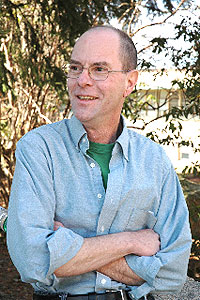Each Monday and Wednesday, Professor Charles Hartman walks into English 240: Reading and Writing Poetry with a cup of coffee, a stack of papers and a short and snappy greeting to the class. He takes attendance and hands back assignments. He engages in witty banter with his eager students, then commences to share his abundance of knowledge with them.
I wanted to find out more about Professor Hartman, something to identify him beyond superficial descriptions such as “the man with the circle framed glasses” or, more often, “the guy with the bald head.”
In a brief interview, I began to do just that.
Professor Hartman is an expert in the world of poetry. He has published books, created computer software, given presentations and written essays all about poetry. Most prominently, he even crafts his very own poems.
Arriving at Conn in 1984, initially teaching just one class in poetry each semester, he has remained with the college for the past twenty-seven years and has become a tenured professor in the Department of Literatures in English. He has enjoyed the benefits of Conn’s small college setting to engage students in the classroom and “enable and almost force conversation across the boundaries among disciplines and departments and divisions.”
As a student in one of Professor Hartman’s Reading and Writing Poetry (one of his favorite courses to teach), I’ve been exposed to his masterful teaching techniques. He engages with his students in class by drawing from the world outside of the classroom to make connections with the basic questions of poetry.
It is apparent that he is “continually excited about exploring basic questions — questions more basic than people usually ask — about language and what we use it for, and watching those questions ramify and exfoliate into some of the most complex and subtle and eccentric things humans do,” he said. “This all happens most intensely in class discussions, though not only there. As the years go by, I enjoy watching how students’ approaches to and uses for poetry change.”
Professor Hartman also intimated many of his passions and interests beyond the classroom. When asked what he would do if he were not a teacher, he responded, “There are other applications for my fascination and experience with language — for example, I’m being consulted as an expert witness in a legal case. But I’d be tempted to follow the other path I contemplated in college: being a musician. Fortunately, that’s something I can pursue even while the teaching profession thrives.”
He considers art his life and constantly practices various artistic crafts, whether “waking or sleeping.” He also enjoys taking walks, playing with a friend’s dog, reading linguistics, science fiction and history, attending exhibitions, creating music and traveling (most often to Greece) for weeks or even several months at a time, listening, watching, writing and taking pictures while on his travels.
Professor Hartman revealed some interesting personal secrets to me. His favorite film is Akira Kurosawa’s The Seven Samurai, he is left-handed and “for baroque historical reasons [his] middle name is Ossian.” When asked what three things he cannot live without, he responded, “Freud defined health as the ability to love and to work. Those are the two things I begin to die without; we all do. Any third thing is gravy.”
Finally, Professor Hartman offered some valuable words of wisdom.
“When I was a student, it seems to me, I hardly ever followed anyone’s advice, so it would feel hypocritical to offer it. Everybody tells students, ‘Do what you love.’ I suggest that you’ll often find yourself not in a position to do that. At those times it’s difficult but crucial to remember what you love and aren’t at the moment able to do. Then you find a way to do it.” •










